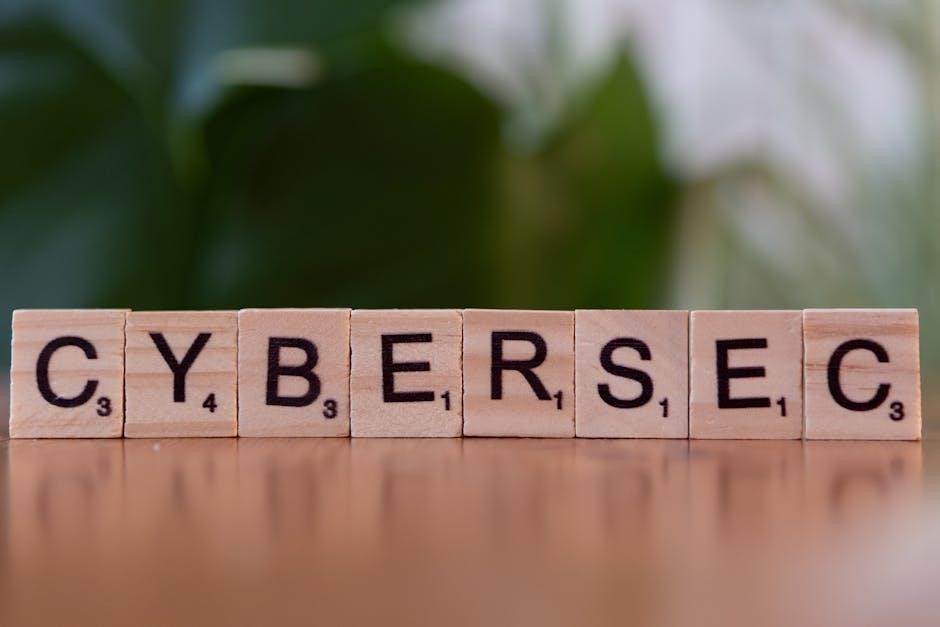Enhance your cybersecurity knowledge with our comprehensive PDF‚ featuring diverse questions and answers. Perfect for offline study‚ it covers essential topics like ethical hacking and cryptography‚ helping you identify gaps and reinforce learning effectively.
Why Cybersecurity Awareness is Essential
Cybersecurity awareness is crucial in today’s digital landscape‚ where threats like phishing‚ ransomware‚ and malware are prevalent; Educating individuals helps prevent breaches and protects sensitive data. Regular quizzes and tests ensure teams stay informed and vigilant‚ addressing knowledge gaps. Cybersecurity training fosters a culture of safety‚ empowering employees to recognize risks and respond effectively. By prioritizing awareness‚ organizations can minimize vulnerabilities and safeguard their assets‚ ensuring long-term security and resilience in an ever-evolving threat environment.
Identifying Knowledge Gaps Through Quizzes
Cybersecurity quizzes are an essential tool for identifying knowledge gaps in individuals and teams. By assessing understanding through multiple-choice‚ true/false‚ and short-answer questions‚ quizzes reveal areas where additional training is needed. Regular testing helps pinpoint weaknesses in critical topics like phishing‚ encryption‚ and ransomware. This targeted approach allows for tailored learning strategies‚ ensuring everyone gains the necessary skills to stay secure. Quizzes also promote continuous improvement‚ fostering a culture of proactive cybersecurity awareness in both personal and professional settings.
Engaging Teams with Security Awareness Quizzes
Security awareness quizzes are a dynamic way to engage teams and foster collaboration. By incorporating interactive elements like phishing simulations and gamified challenges‚ quizzes make learning fun and competitive. Group activities and discussions encourage teamwork‚ while individual assessments help track progress. Regular quizzes ensure consistent participation and reinforce key concepts‚ creating a culture of shared responsibility for cybersecurity. This approach not only boosts engagement but also equips teams with practical skills to handle real-world threats effectively.

Types of Cyber Security Quiz Questions
Cybersecurity quizzes include multiple-choice questions (MCQs)‚ true/false‚ short answers‚ and essays. These formats assess knowledge retention‚ understanding‚ and problem-solving skills effectively.
Multiple Choice Questions (MCQs) in Cyber Security
Multiple-choice questions (MCQs) are a popular format in cybersecurity quizzes‚ offering a structured approach to testing knowledge. With options like “What is the primary purpose of a firewall?” or “Which encryption algorithm is commonly used for secure data transmission?‚” these questions cover a wide range of topics‚ from network security to ethical hacking. They are ideal for quick assessments‚ self-evaluation‚ and identifying gaps in understanding. Many MCQs are arranged chapter-wise‚ providing a focused learning experience. They also include answer keys‚ making them a valuable tool for exam preparation and skill enhancement.
True or False Questions for Cybersecurity Awareness
True or False questions are an effective way to assess basic cybersecurity knowledge and promote awareness. Examples include statements like “Using strong passwords guarantees complete security” or “All phishing attempts are easy to identify.” These questions test understanding of fundamental concepts‚ such as malware‚ encryption‚ and safe browsing habits. They are simple yet impactful‚ making them ideal for quick assessments and engaging team exercises. Answer keys provide clear explanations‚ helping participants learn from their responses and improve their cybersecurity skills. This format ensures active participation and knowledge retention in a straightforward manner.
Short Answer and Essay Questions for Deep Understanding
Short answer and essay questions are designed to evaluate critical thinking and in-depth knowledge of cybersecurity concepts. These questions require participants to explain complex topics like incident response‚ cryptography‚ or ethical hacking in detail. They encourage analytical skills and the ability to apply knowledge to real-world scenarios. Examples include “Explain the process of a ransomware attack and its mitigation strategies” or “Discuss the importance of firewalls in network security.” Essay questions provide a platform for comprehensive understanding‚ while short answers offer concise yet meaningful insights. Model answers and detailed explanations are often included to enhance learning and clarity.
Key Topics Covered in Cyber Security Quizzes
Cybersecurity quizzes cover essential topics like cyber laws‚ ethical hacking‚ cryptography‚ network security‚ and information security. These questions help participants understand core concepts and industry standards.
Cyber Laws and Ethical Hacking Basics
Cyber laws and ethical hacking basics are fundamental topics in cybersecurity quizzes. These questions cover legal frameworks‚ data privacy regulations‚ and ethical practices in hacking. Participants learn to distinguish between lawful and unlawful activities in the digital space‚ while understanding the importance of ethical hacking in identifying vulnerabilities. Quizzes also test knowledge of cybercrimes‚ intellectual property rights‚ and compliance standards. This section ensures a strong foundation in both legal and technical aspects of cybersecurity‚ preparing individuals to navigate complex digital environments responsibly. Regular practice helps reinforce these critical concepts effectively.
Phases of Security and Cryptography Fundamentals
Phases of security and cryptography fundamentals are critical in cybersecurity quizzes. These questions explore encryption‚ decryption‚ and secure data transmission methods. Participants learn about hashing‚ digital signatures‚ and algorithm basics‚ such as AES and RSA. Quizzes also cover the lifecycle of security protocols‚ from design to implementation. Understanding these concepts is vital for protecting sensitive information and ensuring data integrity. Regular practice helps reinforce knowledge of cryptographic techniques and their practical applications in modern security systems‚ enabling individuals to apply these principles effectively in real-world scenarios. This section is essential for building a solid technical foundation in cybersecurity.
Understanding Cyber Safety and Computer Networks
Cyber safety and computer networks are fundamental topics in cybersecurity quizzes. Questions cover network fundamentals‚ safety practices‚ and protocols. Participants learn about firewalls‚ VPNs‚ and Wi-Fi security. These quizzes also explore common threats like malware and phishing‚ teaching how to safeguard data. Understanding network architectures and devices is crucial for securing systems. Regular practice helps individuals master these concepts‚ ensuring they can protect both personal and organizational networks effectively. This knowledge is essential for maintaining privacy and security in an increasingly connected world.
Deep Web and Security Tools Explained
The deep web and security tools are critical areas in cybersecurity quizzes. Questions explore the deep web’s anonymity networks‚ like Tor‚ and their implications for security. Participants learn about encryption methods and tools used to protect data. These quizzes also address risks associated with the dark web and how to mitigate them. Understanding security tools like firewalls and intrusion detection systems is emphasized. Regular practice helps individuals grasp these concepts‚ enhancing their ability to secure systems and safeguard sensitive information in a complex digital landscape.

Benefits of Using a Cyber Security Quiz PDF
Enhance learning with offline access‚ self-paced study‚ and cost-effective revision. Ideal for remote practice‚ it supports continuous improvement and better retention of cybersecurity concepts anytime‚ anywhere.
Convenience of Offline Access
The Cyber Security Quiz PDF offers unparalleled convenience‚ allowing users to access questions and answers offline. This feature is especially beneficial for remote workers‚ students‚ and professionals who need to study without reliable internet connectivity. Offline access ensures uninterrupted learning‚ enabling individuals to review cybersecurity concepts anytime‚ anywhere. The PDF format is lightweight and easily portable‚ making it ideal for self-paced study sessions. Whether commuting‚ traveling‚ or in areas with limited internet‚ the PDF remains a reliable resource for continuous learning and exam preparation.
Easy Printing for Group Sessions
The Cyber Security Quiz PDF is designed for easy printing‚ making it ideal for group sessions and team activities. Printed copies can be distributed during workshops‚ training sessions‚ or classroom discussions‚ fostering collaborative learning. This feature is particularly useful for organizations conducting cybersecurity awareness programs or educational institutions teaching related courses. Printed materials facilitate face-to-face interactions‚ allowing participants to engage in discussions and share insights effectively. It’s a practical way to ensure everyone has access to the content‚ promoting active participation and better understanding of cybersecurity concepts.
Tracking Progress and Reinforcing Learning
The Cyber Security Quiz PDF enables users to track their progress effectively. With structured questions and answers‚ learners can identify knowledge gaps and focus on weaker areas. Regular testing helps reinforce concepts‚ ensuring long-term retention. The PDF format allows for easy review of correct and incorrect answers‚ enabling users to revisit challenging topics. This iterative process enhances understanding and improves readiness for exams or real-world security scenarios‚ making it a valuable tool for continuous learning and skill development in cybersecurity.

Preparing for Cyber Security Exams and Interviews
Boost your exam and interview readiness with our Cyber Security Quiz PDF. Featuring 1000+ chapter-wise MCQs‚ it helps identify gaps and improve problem-solving skills effectively.
1000+ MCQs for Practice
Our Cyber Security Quiz PDF includes over 1000 multiple-choice questions‚ carefully organized by chapters to facilitate structured learning. These MCQs cover a wide range of topics‚ from cyber laws and ethical hacking to cryptography and network security. Designed to test your understanding and identify knowledge gaps‚ they provide a comprehensive practice platform for exams‚ interviews‚ and online assessments. Each question is paired with detailed answers‚ helping you track progress and reinforce learning effectively. Perfect for both beginners and advanced learners‚ these MCQs ensure a thorough preparation for cybersecurity challenges.
Chapter-Wise Arrangement for Structured Learning
The Cyber Security Quiz PDF is organized into chapters‚ each focusing on specific areas like network security‚ cryptography‚ and ethical hacking. This structured approach ensures a logical progression from basic to advanced topics‚ making it easier to follow and retain information. With questions and answers arranged by chapter‚ users can systematically prepare for exams‚ interviews‚ or self-assessment‚ reinforcing their understanding of key cybersecurity concepts and practical applications.
Importance of Mock Tests and Online Quizzes
Mock tests and online quizzes are invaluable tools for cybersecurity preparation. They simulate real exam environments‚ helping users assess their knowledge and identify gaps. Regular practice with these resources improves retention and confidence. Online quizzes also provide immediate feedback‚ allowing learners to track progress and focus on weaker areas. With topics ranging from cyber laws to ethical hacking‚ these tools ensure comprehensive understanding and practical application of cybersecurity concepts‚ making them essential for both beginners and professionals.

Specific Areas of Focus in Cyber Security Quizzes
Cyber security quizzes emphasize key areas like network security‚ cryptography‚ ethical hacking‚ and information protection. These topics ensure a well-rounded understanding of modern security challenges and solutions.
- Network Security Fundamentals
- Information Security Best Practices
- Cryptography in Modern Systems
- Ethical Hacking and Cybercrime Prevention
Network Security Fundamentals
Network security fundamentals are essential for protecting data integrity and confidentiality. Key topics include firewalls‚ VPNs‚ intrusion detection systems‚ and secure communication protocols like SSL/TLS. Understanding network architectures‚ such as TCP/IP and DNS‚ is crucial for identifying vulnerabilities. Quizzes on these subjects help reinforce concepts like packet analysis‚ access control lists‚ and Wi-Fi security. They also address common threats like DDoS attacks and malware‚ ensuring a solid foundation in network defense strategies. Regular testing aids in retaining knowledge and staying updated with evolving security measures.
Information Security Best Practices
Information security best practices are critical for safeguarding sensitive data. Key areas include encryption of sensitive data‚ strong access controls‚ and regular security audits. Implementing multi-factor authentication (MFA) and securing endpoints are vital. Quizzes often cover topics like data loss prevention‚ incident response‚ and secure communication protocols. They emphasize the importance of employee training and phishing simulations to enhance awareness. Additionally‚ questions address backup strategies and disaster recovery plans to ensure business continuity. Regular testing helps ensure adherence to these practices and prepares teams for real-world threats.
Cryptography in Modern Security Systems
Cryptography plays a pivotal role in modern security systems by ensuring data integrity‚ confidentiality‚ and authenticity. Quiz questions often focus on encryption algorithms like AES and RSA‚ as well as decryption methods. They also cover digital signatures‚ hashing‚ and secure communication protocols. Understanding key management and SSL/TLS is essential. Additionally‚ questions explore the role of cryptography in VPNs‚ secure messaging apps‚ and blockchain technology. These topics help participants grasp how cryptography safeguards data in transit and at rest‚ making it a cornerstone of cyber security.
Ethical Hacking and Cybercrime Prevention
Ethical hacking involves understanding attacker tactics to strengthen security systems. Quiz questions explore penetration testing‚ vulnerability assessment‚ and countermeasures. They also cover legal frameworks and ethics in hacking. Cybercrime prevention strategies‚ such as firewalls‚ encryption‚ and secure passwords‚ are emphasized. Questions address real-world threats like phishing‚ ransomware‚ and social engineering‚ teaching participants how to identify and mitigate risks. This section helps users develop proactive approaches to safeguard systems and data from malicious actors.

Creating Effective Cyber Security Quizzes
Design engaging quizzes with diverse question types‚ ensuring relevance and accuracy. Incorporate visual aids and interactive elements to cater to all skill levels and enhance learning engagement.
Designing Questions for All Skill Levels
Create a variety of questions to cater to different expertise levels‚ from basic to advanced. Use multiple-choice‚ true/false‚ and open-ended formats to ensure inclusivity. For beginners‚ focus on foundational concepts like cyber laws and network security. For intermediate learners‚ include scenario-based questions on ethical hacking and cryptography. Advanced questions can cover emerging technologies and risk assessment. Balance difficulty levels to keep all participants engaged and challenged‚ ensuring comprehensive learning opportunities for everyone involved in the quiz.
Ensuring Relevance and Accuracy
Regularly update your quiz questions to reflect the latest cybersecurity threats and technologies. Incorporate expert reviews to verify the accuracy of content. Use clear‚ unbiased language to avoid confusion. Ensure questions align with real-world scenarios‚ making them practical and applicable. Provide detailed explanations for answers to enhance understanding. Avoid outdated information and focus on industry-recognized standards and best practices. This approach ensures the quiz remains a reliable tool for learning and assessment in the ever-evolving field of cybersecurity.
Using Visual Aids and Game Materials
Incorporate visual aids like diagrams‚ charts‚ and infographics to simplify complex cybersecurity concepts. Utilize interactive games‚ quizzes‚ and simulations to make learning engaging. Gamified elements such as point systems and leaderboards can motivate participants. Videos and animations can demonstrate real-world scenarios‚ like phishing attacks or ransomware incidents. These tools enhance understanding‚ retention‚ and practical application of knowledge. They also create a dynamic learning environment‚ making cybersecurity training more interactive and enjoyable for all skill levels. This approach fosters better engagement and long-term retention of essential security practices.

Popular Cyber Security Quiz Resources
Discover downloadable PDFs‚ free online quizzes‚ and professional tests. These resources cover essential topics‚ offering convenient learning tools and checklists to enhance cybersecurity knowledge and exam preparation.
Downloadable PDFs for Easy Access
Access comprehensive cybersecurity quiz PDFs‚ featuring 1000+ MCQs and detailed answers. These resources cover essential topics like cyber laws‚ ethical hacking‚ and cryptography‚ arranged chapter-wise for structured learning. Perfect for offline study‚ they allow convenient revision and practice anytime‚ anywhere. Ideal for exams‚ interviews‚ and self-assessment‚ these PDFs help reinforce cybersecurity knowledge and identify skill gaps effectively‚ ensuring you stay prepared for various security challenges.
Free Online Quizzes and Mock Tests
Engage with free online cybersecurity quizzes and mock tests to enhance your knowledge interactively. These resources offer immediate feedback and cover diverse topics like network security‚ phishing identification‚ and risk assessment. Platforms provide chapter-wise practice tests‚ ideal for self-assessment and exam preparation. Utilize these tools to reinforce learning‚ identify gaps‚ and stay updated with emerging technologies and security trends. Perfect for continuous skill improvement‚ they complement PDF materials for a well-rounded study approach.
Professional Tests and Checklists
Professional cybersecurity tests and checklists provide in-depth assessments for advanced learners and organizations. These resources include detailed question banks‚ compliance guidelines‚ and practical exercises tailored for specific industries. Many professional tests are designed to simulate real-world scenarios‚ ensuring hands-on experience. Checklists help organizations verify their security measures and identify vulnerabilities. With topics ranging from network security to ethical hacking‚ these tools are invaluable for both individual skill development and organizational security audits. They complement PDF materials by offering structured‚ actionable insights for continuous improvement.

Cyber Security Quiz for Remote Workers
Address remote work security challenges with our tailored quiz‚ covering VPNs‚ phishing‚ and home office safety. Essential for all employees to enhance their cybersecurity awareness and preparedness.
Addressing Home Office Security Challenges
Remote work introduces unique security risks‚ such as unsecured Wi-Fi networks‚ phishing attacks‚ and physical device exposure. Our quiz helps employees identify and mitigate these threats‚ ensuring safe VPN usage‚ strong password practices‚ and proper data handling. It also covers recognizing suspicious emails and encrypting sensitive information. By addressing these challenges‚ remote workers can create a secure home office environment‚ protecting both personal and professional data from potential breaches or unauthorized access.
24 Essential Questions for All Employees
Our quiz includes 24 critical questions tailored for all employees‚ ensuring a strong foundation in cybersecurity. Topics range from password security and phishing detection to safe VPN usage and ransomware prevention. Designed for both technical and non-technical staff‚ these questions help identify vulnerabilities and promote best practices. Regular testing with these essential questions ensures everyone‚ from entry-level to executive roles‚ understands their role in maintaining organizational security and protecting sensitive data from evolving threats.
Coronavirus-Specific Security Awareness
Addressing the surge in cyber threats during the pandemic‚ this section focuses on COVID-19-related security risks. The quiz includes questions on remote work security‚ phishing emails exploiting coronavirus fears‚ and safe VPN practices. It helps employees recognize pandemic-related scams and protects sensitive data while working from home. Stay informed about emerging threats and adopt best practices to safeguard personal and organizational information during crises.

Advanced Cyber Security Topics in Quizzes
Explore advanced topics like emerging technologies‚ zero-day exploits‚ and AI in security. These questions challenge experts and provide deep insights into modern cybersecurity threats and solutions.
Emerging Technologies and Security Risks
Emerging technologies like AI‚ IoT‚ and blockchain introduce new security challenges. Quizzes address risks such as zero-day exploits‚ ransomware‚ and supply chain vulnerabilities. They also cover AI-driven threats‚ data breaches‚ and privacy concerns. Understanding these risks is crucial for modern cybersecurity strategies. Regular testing helps professionals stay updated on securing emerging technologies and mitigating potential threats effectively.
ISO Standards for Cybersecurity
ISO standards play a vital role in establishing robust cybersecurity frameworks. Quizzes often include questions on ISO 27001 and ISO 27002‚ focusing on best practices for information security management. These questions help participants understand compliance requirements‚ risk management‚ and security controls. Regular testing on ISO standards ensures organizations can effectively implement and maintain secure systems‚ protecting sensitive data and ensuring alignment with global security benchmarks.
Risk Assessment and Access Control
Risk assessment and access control are critical components of cybersecurity. Quizzes often test knowledge on identifying threats‚ vulnerabilities‚ and implementing controls. Questions focus on methodologies for risk evaluation‚ such as likelihood and impact analysis‚ and best practices for access management. Regular testing ensures understanding of how to mitigate risks and enforce least privilege principles‚ aligning with standards like ISO 27001. These concepts are essential for securing systems and data‚ making them key areas in cybersecurity education and exams.
Interactive Cyber Security Learning Tools
Engage with online games like Cyber Smackdown and phishing email exercises to enhance learning. These tools offer interactive experiences‚ promoting teamwork and practical security awareness skills effectively.
Online Games Like Cyber Smackdown
Engage with interactive online games such as Cyber Smackdown‚ which challenges players to answer cybersecurity questions. These games make learning fun and competitive‚ helping users apply their knowledge in real-world scenarios. Symantec’s Cyber Smackdown is a prime example‚ offering a dynamic way to test skills and gain insights into security best practices. While the question list is short‚ the experience provides valuable exposure to key concepts.
Such games are ideal for supplementing traditional study materials like PDFs‚ fostering teamwork and healthy competition while reinforcing cybersecurity awareness.
Phishing Email Identification Exercises
Phishing email identification exercises are crucial for improving cybersecurity awareness. These exercises simulate real-world scenarios‚ helping users recognize red flags like suspicious links or generic greetings. Players are presented with emails and must determine if they are legitimate or malicious. Tools like Jigsaw’s eight-question quiz and Symantec’s Cyber Smackdown game provide interactive ways to test skills. These exercises are especially valuable for remote workers‚ as they reinforce best practices for handling emails safely. Regular practice enhances the ability to spot phishing attempts‚ reducing risks in both personal and professional environments.
Group Activities for Enhanced Engagement
Group activities like quizzes and competitions enhance cybersecurity engagement and knowledge retention. These interactive exercises encourage teamwork and collaboration‚ making learning fun and effective. Participants can brainstorm solutions to security challenges or role-play scenarios‚ fostering practical application of concepts. Group discussions on case studies and real-world incidents further deepen understanding. Such activities not only strengthen problem-solving skills but also promote a culture of shared learning‚ ensuring everyone stays informed and proactive about cybersecurity best practices. Regular group sessions can significantly improve overall awareness and preparedness within teams.

Final Tips for Effective Cyber Security Quizzes
Regular testing reinforces learning‚ while encouraging continuous improvement. Use quizzes as a training tool to ensure teams stay updated and proactive in maintaining strong security practices.
Regular Testing for Knowledge Retention
Regular cyber security quizzes are crucial for reinforcing learning and ensuring long-term knowledge retention. Consistent testing helps identify gaps and prevents knowledge decay‚ keeping teams updated on evolving threats. By incorporating quizzes into training routines‚ organizations can maintain a proactive approach to security awareness. Frequent assessments also encourage continuous learning and adaptation to new challenges. Utilize PDF resources for offline practice and track progress over time to ensure a well-informed and resilient workforce. Regular testing fosters a culture of preparedness and accountability in safeguarding digital assets.
Encouraging Continuous Learning
Cyber security quizzes are an effective tool for promoting continuous learning and staying updated with the latest threats and technologies. Regular engagement with quiz questions helps individuals and teams build a strong foundation in security practices. PDF resources offer convenient access to a wide range of topics‚ from ethical hacking to cryptography‚ enabling learners to explore new areas at their own pace. By fostering a habit of regular practice‚ quizzes ensure that knowledge remains fresh and applicable in real-world scenarios‚ fostering a culture of lifelong learning and adaptability in the ever-evolving field of cyber security.
Using Quizzes as a Training Tool
Cyber security quizzes serve as an effective training tool‚ enabling individuals and teams to assess their knowledge and identify gaps. Regularly incorporating quizzes into training programs helps reinforce best practices and ensures a strong understanding of key concepts. The PDF format allows for easy distribution and offline access‚ making it ideal for group sessions or self-study. By tracking progress through quizzes‚ learners can monitor their improvement and stay motivated to enhance their skills‚ ultimately contributing to a more secure and informed workforce.
